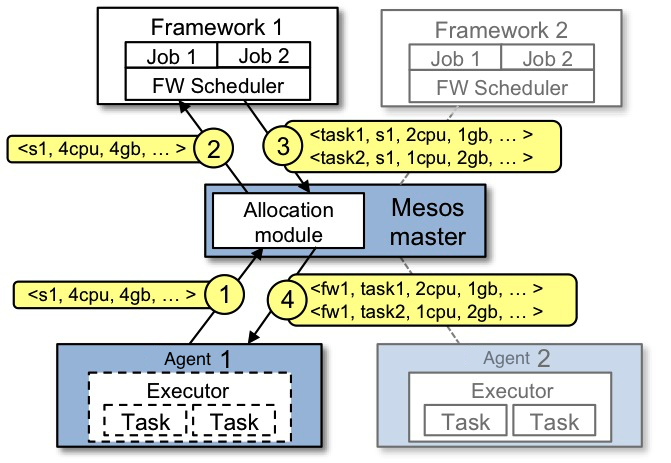Maximizing and Isolating computer resources across physical hardware systems as been around for a while.
Recently though we have seen Open Source systems having become the corner stone to operate and run distributed systems (over your operating system).
i.e. Apache Mesos & Apache Hadoop YARN
A goal is to provide a sufficient amount of functions and abstractions so that the Kafka server can launch within those and the management of the brokers, producers and consumers (including configurations) are manageable and workable by them.
Another goal is to not introduce any dependencies on brokers, producers and consumers to be able to-do this.
The work for this is being done in https://issues.apache.org/jira/browse/KAFKA-1206
Apache Mesos
In the initial implementation of this, Apache Mesos will be tested to create this abstraction and an implementation of a Kafka-Mesos project that will bridge/glue them together.
The tested code for the KafkaMesos implementation will be under https://issues.apache.org/jira/browse/KAFKA-1207
KafkaMesos has a few parts to it which is implemented overall
1) The framework
The framework is responsible for managing the scheduled jobs that are running.
2) The scheduler
The scheduler understands what is running on slaves (so what resources are available) and will decide what to-do. This is really awesome because you can wait until you have a certain amount of resources and it is as a certain time before automatically launching Kafka producers, consumers or brokers. There is a lot to benefit from here for folks and we need to provide some hooks for them to operate it (i.e. bin/kafka-mesos-scheduler-start.sh w/ options)
3) The executor gets information from the framework (like environmental variables / configuration information) and launches tasks with it.
The existing implementations I have been looking at for reference are for Hadoop https://github.com/mesos/hadoop/tree/master/src/main/java/org/apache/hadoop/mapred and Storm https://github.com/mesosphere/storm-mesos/tree/master/src/jvm/storm/mesos along with the examples.
I am tending right now to go with the environmental value approach. This uses the mesos.proto structures to pass an array/list of value within the enviornment structure. We can set this in the scheduler and read it the Executor during the call of
def registered(executorDriver: ExecutorDriver, executorInfo: ExecutorInfo, frameworkInfo: FrameworkInfo, slaveInfo: SlaveInfo)
executorInfo.command.environment.variables
variables are a list of name/value string pairs
The specific behind these structures are in the Mesos protobuf file https://github.com/apache/mesos/blob/master/include/mesos/mesos.proto?source=c
The Scheduler and Executor API http://mesos.apache.org/documentation/latest/app-framework-development-guide/
More on the Mesos Architecture
Example of resource offer
The figure below shows an example of how a framework gets scheduled to run a task.
Let's walk through the events in the figure.
- Slave 1 reports to the master that it has 4 CPUs and 4 GB of memory free. The master then invokes the allocation policy module, which tells it that framework 1 should be offered all available resources.
- The master sends a resource offer describing what is available on slave 1 to framework 1.
- The framework's scheduler replies to the master with information about two tasks to run on the slave, using <2 CPUs, 1 GB RAM> for the first task, and <1 CPUs, 2 GB RAM> for the second task.
- Finally, the master sends the tasks to the slave, which allocates appropriate resources to the framework's executor, which in turn launches the two tasks (depicted with dotted-line borders in the figure). Because 1 CPU and 1 GB of RAM are still unallocated, the allocation module may now offer them to framework 2.
In addition, this resource offer process repeats when tasks finish and new resources become free.
While the thin interface provided by Mesos allows it to scale and allows the frameworks to evolve independently, one question remains: how can the constraints of a framework be satisfied without Mesos knowing about these constraints? For example, how can a framework achieve data locality without Mesos knowing which nodes store the data required by the framework? Mesos answers these questions by simply giving frameworks the ability to reject offers. A framework will reject the offers that do not satisfy its constraints and accept the ones that do. In particular, we have found that a simple policy called delay scheduling, in which frameworks wait for a limited time to acquire nodes storing the input data, yields nearly optimal data locality.
You can also read much more about the Mesos architecture in this technical paper.
